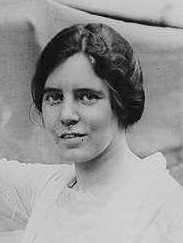
(January 11, 1885 – July 9, 1977)
Lawyer, Suffragist, and Activist in the Struggle for Gender Equality
It is with great sadness that we mark the death Alice Paul, a true advocate for equal rights and one of our most important leaders. Throughout her 92 years of life and activism, Alice not only witnessed some of the greatest moments in women’s rights history (and, therefore, the history of this nation, but she also played a key role in creating change and raising societal consciousness regarding the need for full gender equality in the United States.
Indeed, it was Alice who first drafted the amendment we are currently struggling to ratify today. After her involvement in the women’s suffrage movement led to a victory in 1919, she first publicly presented this new bill in 1923 on the 75th anniversary of the historic Seneca Falls convention. Originally dubbed the “Lucretia Mott Equal Rights Amendment”, this proposed addition to our nation’s constitution will forever be associated with the person who started and spearheaded our efforts. Thus, today, we continue in our fight to ratify the “Alice Paul Amendment” in order to secure equal treatment, opportunities, and liberties for American women.
With an educational background that includes degrees from Swarthmore College and the University of Pennsylvania, Alice was truly a visionary who dared to demand that society embrace gender equality. Her visible efforts to combat the oppression began during her time studying abroad in London, where she was a part of the British women’s suffrage movement. Having been arrested and jailed several times for her extreme level of involvement in this movement, Paul eventually used the same tactics in the struggle to gain women’s suffrage in the U.S. Returning to the States, she served as a member of the National American Woman Suffrage Association (NAWSA), where she was the chair of its congressional committee.
Yet, she eventually left this group to found the more radical Congressional Union for Woman Suffrage with Lucy Burns. Later renamed the National Woman’s Party (NWP), its members picketed the White House in 1917 to convey its message, the first group ever to do so. As a result, Paul was jailed in October and November of that year and then went on a hunger strike to protest this arrest.
Eventually, her hard work and extreme measures inspired many women to take action, and the 19th Amendment of 1920 finally granted American women the right to vote. However, Alice was wise in noting that equal rights for women would not be achieved by simply gaining the right to vote, as crucial as that step was. In 1923, she introduced the first equal rights amendment in Congress to ensure that women and men would be treated equally under the law in every possible regard.
Though she did get an equal rights affirmation in the preamble to the United Nations charter, Alice did not live to see the Equal Rights Amendment become a part of the U.S. Constitution. Until she suffered from a severe stroke in 1974, Alice Paul continued to lead our movement’s fight for the equal rights amendment. She died on July 9, 1977, in Moorestown, New Jersey, but her indefatigable spirit and intense commitment to the promise of an equal society will continue to guide our struggle to ratify the ERA and render gender inequality illegal.
